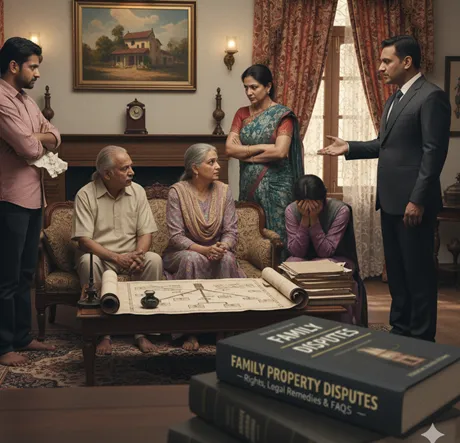
Disputes over ancestral or joint family property are common in India. Legal heirs, including sons, daughters, and widows, have equal rights to claim their share. Conflicts usually arise when one member:
- Takes more than their legal share
- Undertakes construction without consent
- Refuses partition or sale with consent
Legal remedies include sending legal notices, filing a partition suit, or seeking a stay on illegal construction.
State-Wise Legal Aid Reference
| State/UT | Legal Aid / Court Info |
|---|---|
| Delhi | Delhi Legal Services Authority |
| Maharashtra | Maharashtra Legal Services Authority |
| Karnataka | Karnataka Legal Services Authority |
| Tamil Nadu | TN State Legal Services Authority |
| Uttar Pradesh | UP Legal Services Authority |
| West Bengal | WB Legal Services Authority |
These portals provide legal aid, mediation services, and information about court fees for property disputes.
FAQs – Family Property Disputes
-
1. I'm a daughter. Can I claim my father's property?
-
Yes. Married or unmarried daughters have equal rights in ancestral or intestate property.
-
2. My brother says I can't claim because I'm married. Is this correct?
-
No. Married daughters are entitled to an equal share.
-
3. What is Ancestral Property?
-
Property inherited for four generations or more without sale or division.
-
4. Can I claim a share even if I don't live there?
-
Yes. Residency is not required to claim your legal share.
-
5. My brother is constructing on joint property. Can I stop him?
-
Yes. You can seek a stay order from the court to prevent unauthorized construction.
-
6. He refuses to give me my share. What can I do?
-
Send a legal notice first. If unresolved, file a partition suit in civil court.
-
7. I live abroad. Can I still claim my share?
-
Yes. NRIs can file claims through a Power of Attorney (POA).
-
8. What if there's no will?
-
Under Hindu Succession Law, all children and the spouse inherit equally.
-
9. Can my mother divide property the way she wants?
-
Only if it's self-acquired. Ancestral or inherited property must be divided among all legal heirs.
-
10. Can my brother sell property without my consent?
-
No. Co-owners must give written consent before any sale.
-
11. Is an oral family settlement valid?
-
No. Courts prefer written and signed agreements, ideally registered.
-
12. I was thrown out of the house. Can I get back in?
-
Yes. Legal heirs or co-owners can approach the court for possession.
-
13. Can my brother rent out joint property?
-
Only with consent from all co-owners.
-
14. What is a partition deed?
-
A legal instrument registering the division of property among co-owners.
-
15. How long does a partition case take?
-
A few months to several years. Family settlement is faster.
-
16. Can one person lock out others?
-
No. Co-owners have equal possession rights unless legally partitioned.
-
17. Is court action always necessary?
-
Not always. Family settlements via mediation are encouraged first.
-
18. Can I claim my share if my father is alive?
-
Not usually, unless he voluntarily transfers property. Claims are valid after his death.
-
19. My brother harasses me over property. What can I do?
-
File a police complaint or women's cell report, and pursue civil action.
-
20. Is going to court expensive?
-
Legal fees exist, but some states provide low court fees for women and free legal aid.
Add new comment